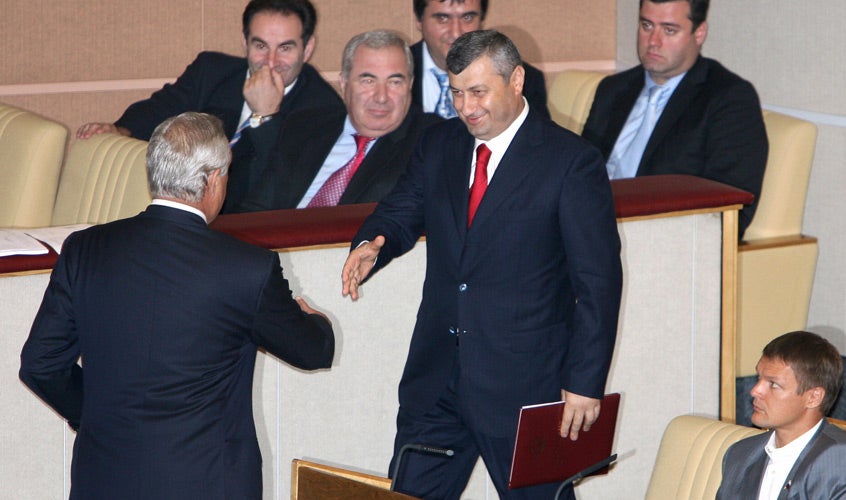Russian MPs raise stakes by backing Georgian rebels

Your support helps us to tell the story
From reproductive rights to climate change to Big Tech, The Independent is on the ground when the story is developing. Whether it's investigating the financials of Elon Musk's pro-Trump PAC or producing our latest documentary, 'The A Word', which shines a light on the American women fighting for reproductive rights, we know how important it is to parse out the facts from the messaging.
At such a critical moment in US history, we need reporters on the ground. Your donation allows us to keep sending journalists to speak to both sides of the story.
The Independent is trusted by Americans across the entire political spectrum. And unlike many other quality news outlets, we choose not to lock Americans out of our reporting and analysis with paywalls. We believe quality journalism should be available to everyone, paid for by those who can afford it.
Your support makes all the difference.Russian lawmakers have voted unanimously to ask the president to recognise the independence of Georgia's two rebel provinces, a move likely to anger the United States, the European Union and other Georgian allies.
Russia has raised the stakes in the political fallout over its war with Georgia, as both houses of the Russian parliament voted unanimously to recognise the independence of South Ossetia and Abkhazia. The final decision on whether to recognise Georgia's two breakaway regions as independent countries will be taken by Russian President Dmitry Medvedev.
The vote on a resolution came as the last Russian soldiers still inside Georgia proper showed no sign of pulling out, and a military spokesman in Moscow said that Russian peacekeepers would from now on check all cargo unloaded at Georgia's Black Sea port of Poti.
French President Nicolas Sarkozy has called a crisis summit of EU leaders in Brussels next week to discuss relations with Russia. The US and European countries have spoken out strongly in favour of retaining Georgia's territorial integrity, but Russia is buoyant after routing Georgia militarily and proving that the West has little influence over Moscow's plans for Georgia's breakaway states.
Russia appeared to outmanoeuvre the west diplomatically yet again yesterday, as Mr Medvedev told his ambassador to NATO that Russia was ready for any action the alliance might take against Russia, including the suspension of all cooperation. NATO relies heavily on Russian cooperation for its operations in Afghanistan, and the announcement left Western countries scrambling to say that they did not want to suspend all contacts just at the time when they were hoping to send a strong punitive signal to Moscow.
In Georgia, President Mikheil Saakashvili, who since the crisis erupted has largely focused on bringing international politicians and media onside, finally started to tackle internal discontent at his handling of the war. Late on Sunday night he spoke for more than an hour on national television, explaining the causes of the war. He accused Vladimir Putin of wanting a pretext for conflict for several years, and again said that Europe "invited" Russian actions by their silence over recent months.
Mr Saakashvili yesterday paid his first visit to Gori since the Russians handed the city back to Georgian control on Friday evening. The Georgian president was clearly keen to expunge the memory of his last visit to the city in the early days of the conflict, when he was caught on camera being hustled to safety as Russian bombers flew overhead. He stopped and chatted with residents whose houses had been damaged in the bombing raids, and even clambered up a ladder to talk to builders who were doing reconstruction work.
He also thanked opposition leaders for their unity during the crisis period, but several opposition parties have said that once the Russians withdraw fully from the country, they will have tough questions to put to the Georgian president. If Russia does recognise the independence of South Ossetia and Abkhazia, it will be a further blow to the standing of Mr Saakashvili, who came to power promising to reunite Georgia and bring the rebel regions back under Tbilisi's control. Many analysts believe that whatever the Russians decide, after the events of the past few weeks, the Georgians are unlikely to regain control of the two regions.
President Medvedev, who was in the Russian resort town of Sochi, just a few miles from the border with Abkhazia, yesterday, was joined there by Prime Minister Vladimir Putin last night. It is the former president and not the current one who has appeared to make the big decisions during the conflict with Georgia.
If the Russians decide to recognise the independence of the two regions, the next step could be a referendum on absorbing the territories
into Russia. Tiny South Ossetia is hardly viable as an independent state, many of its residents already have Russian passports, and Moscow is expected to finance the rebuilding of Tskhinvali, its battered capital. Most of the Georgian residents have fled, and Ossetian militias have destroyed many of their homes, making it unlikely they can return in the near future.
It was unclear last night when Mr Medvedev would make his decision on the two territories public. "It's not the sort of decision that can be taken in a hurry," said a spokesman for the Russian president. "But we can probably expect some kind of statement over the next few days."
The German chancellor, Angela Merkel, who met Mr Medvedev last week in Sochi said: "I expect that the Russian president won't sign the resolution," which she said would only add tension to an already critical situation.
Join our commenting forum
Join thought-provoking conversations, follow other Independent readers and see their replies
Comments